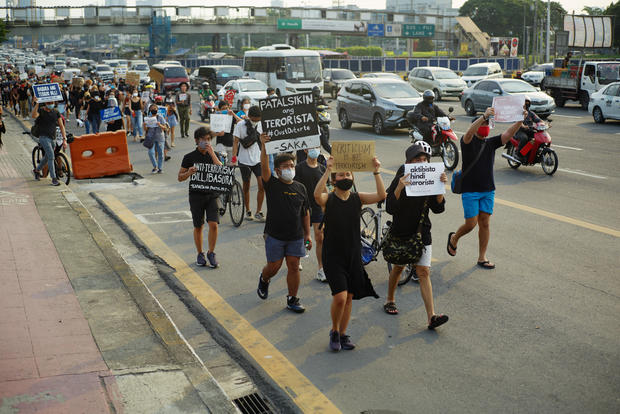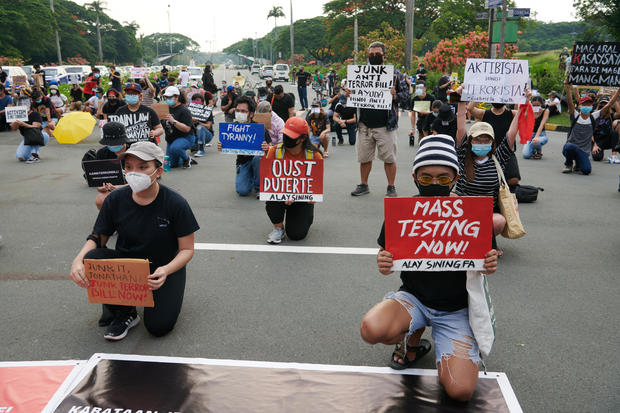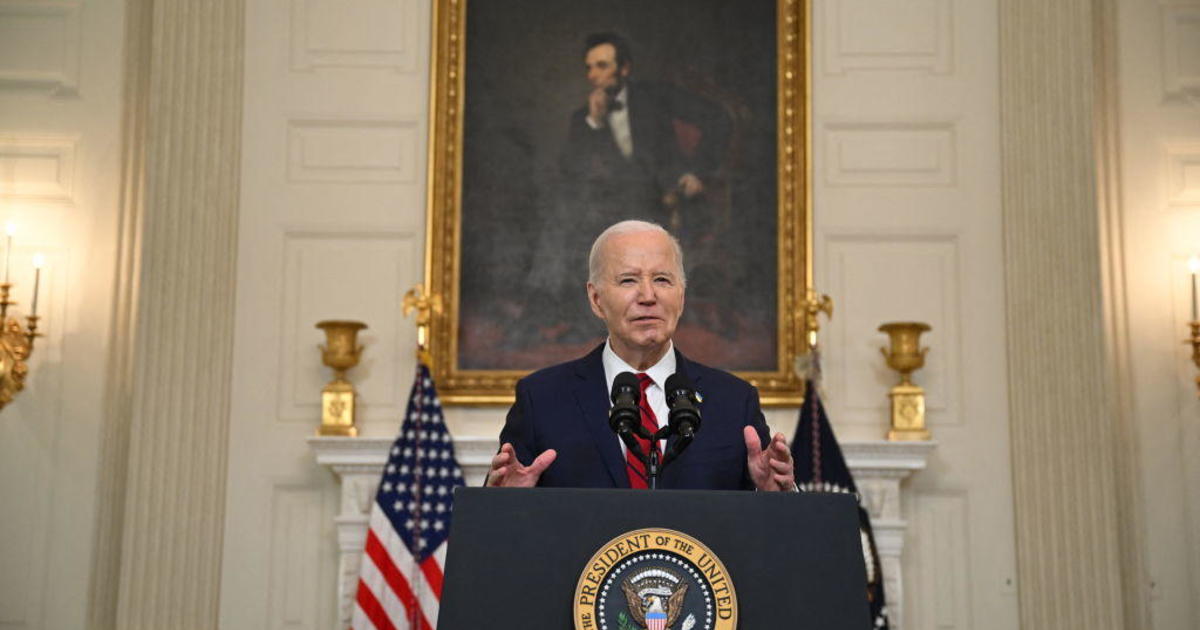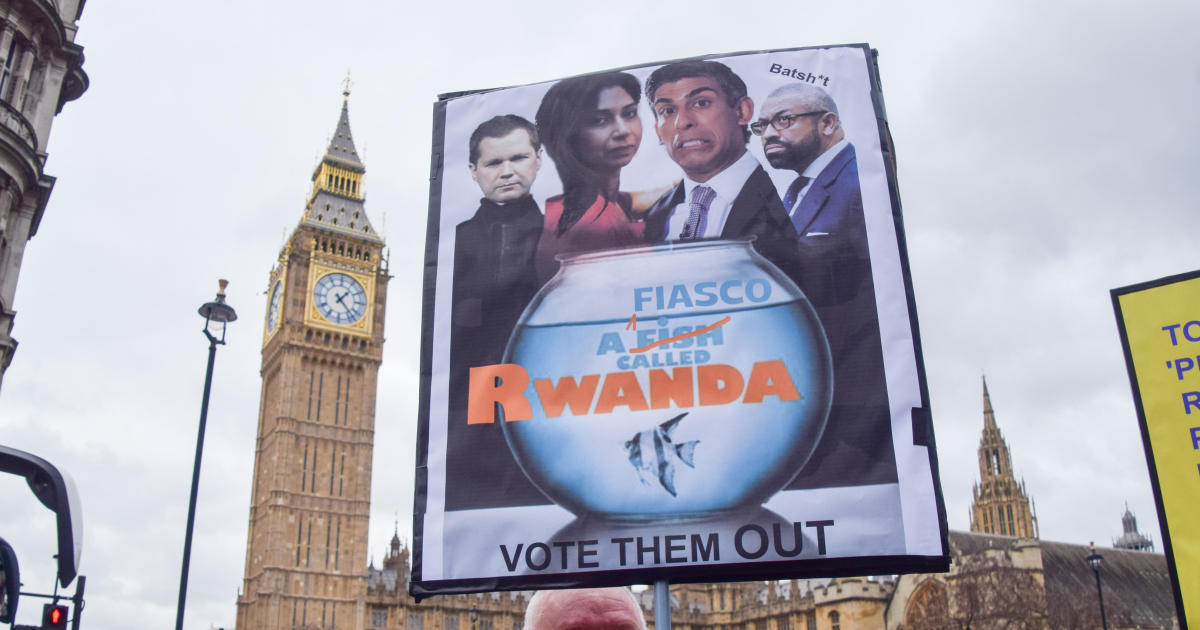Protest against "urgent" anti-terror bill in Philippines gets a boost from Taylor Swift
Manila — Hundreds of Filipinos took to the streets Thursday against a widely-opposed anti-terrorism bill that has now swept through Congress. The controversial legislation, which has drawn opposition from the United Nations and even pop star Taylor Swift, was approved by legislators just days after President Rodrigo Duterte certified it as an "urgent" measure.
Authors of the bill, which Duterte's office said Thursday would still be subjected "to a final review by the President to ensure that it is compliant with our Constitution," say it would strengthen the Philippines' defenses against violent extremism. Critics fear the government would use it, however, to further silence dissent in the country where fears are already mounting over the erosion of free speech.
"This is a dangerous law that can be easily abused," Renato Reyes, secretary general of the left-wing organization Bayan, said during the protest Thursday in Manila. "It allows for an extended period of detention without charges in court. It allows wiretapping, and it allows a body that's not even a court to designate who the terrorist organizations are. That's too much power for the executive; it destroys any remaining checks and balances in government."
Organizers of Thursday's demonstration, the largest since millions of Filipinos were ordered to stay home to curb the spread of the new coronavirus, constantly reminded attendees to stay at arm's length.
"Social distancing, please," they said to mask-wearing protesters over megaphones.
Mass gatherings remain prohibited, even though the government has eased lockdown restrictions, but protest leaders said they were forced to come out to stop the country from crossing a dangerous red line that threatening freedom of expression.
The rally in the capital city came amid a wave of street protests across the United States and the rest of the world following the police killing of George Floyd in Minnesota. At one point during the march, Filipino protesters "took a knee" to show solidarity with the Black Lives Matter movement and the wider pushback against police brutality.
The Duterte government has dismissed concerns over the proposed anti-terrorism law.
"Despite the (anti-terrorism) law, the Constitution remains as the fundamental guarantee of freedom of expression and the entire jurisprudence that has grown from the constitutional provision on freedom of expression," Harry Roque, Duterte's spokesperson, said in an online press briefing earlier in the week.
On Twitter, Senator Panfilo Lacson, one of the bill's coauthors, said he had made sure the bill adheres to the Bill of Rights as enumerated in the 1987 Constitution.
But critics point to recent examples of the government using the force of the law against ordinary citizens who were merely voicing displeasure over officials' handling of the coronavirus crisis as evidence that Duerte's administration could abuse vague provisions in an anti-terror law.
Police have recently arrested at least three people for offering completely nonsensical amounts of money to anyone willing to kill Duterte - a public school teacher or a rickshaw driver, for instance, offering a $1 million bounty in a sarcastic social media post.
The "urgent" legislation is also set for a likely signature by Duterte less than a month after his government ordered the country's biggest broadcast network, ABS-CBN, to stop broadcasting after its license expired.
Congress has sole authority in the Philippines to grant broadcast licenses, but lawmakers in the Lower House, who are overwhelmingly allied with President Rodrigo Duterte, declined to act on bills seeking the renewal of ABS-CBN's permit. Duterte had repeatedly stated his disdain for the network and the family who own it, and there been other high-profile battles between Duterte's government and the free press in the Philippines.
Amid that backdrop, the fight against the new anti-terror bill has garnered international attention.
Taylor Swift posted a link on Tuesday to the "Junk Terror Bill" online petition, and on Thursday, United Nations human rights chief Michelle Bachelet issued a warning against the legislation.
"The vague definitions in the Anti-Terrorism Act may violate the principle of legality," Bachelet said in a 26-page report that detailed widespread human rights violations and persistent impunity in the Philippines.





